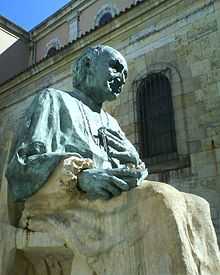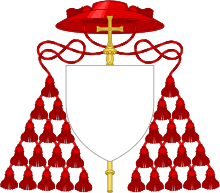Ángel Herrera Oria
| His Eminence Ángel Herrera Oria Servant of God | |
|---|---|
| Bishop Emeritus of Málaga | |
 | |
| Church | Roman Catholic Church |
| Archdiocese | Granada |
| Diocese | Málaga |
| See | Málaga |
| Installed | 24 April 1947 |
| Term ended | 19 August 1966 |
| Predecessor | Balbino Santos y Olivera |
| Successor | Emilio Benavent Escuín |
| Other posts | Cardinal-Priest of Sacro Cuore di Maria (1965-1968) |
| Orders | |
| Ordination | 28 July 1940 |
| Consecration |
30 June 1947 by Gaetano Cicognani |
| Created Cardinal |
22 February 1965 by Pope Paul VI |
| Rank | Cardinal-Priest |
| Personal details | |
| Birth name | Ángel Herrera Oria |
| Born |
19 December 1886 Santander, Cantabria, Spain |
| Died |
28 July 1968 (aged 81) Madrid, Spain |
| Nationality | Spanish |
| Denomination | Roman Catholic |
| Previous post |
|
| Alma mater |
University of Salamanca University of Deusto Complutense University of Madrid |
| Motto | Orationi et ministerio Verbi ("Prayer and the ministry of the Word") |
| Sainthood | |
| Venerated in | Roman Catholic Church |
| Title as Saint | Servant of God |
| Styles of Ángel Herrera Oria | |
|---|---|
 | |
| Reference style | His Eminence |
| Spoken style | Your Eminence |
| Informal style | Cardinal |
| See | Málaga (Emeritus) |
Ángel Herrera Oria (19 November 1886 - 28 July 1968) was a Spanish journalist and Roman Catholic politician and later a cardinal. His cause of canonization has commenced and he is referred to as a Servant of God.
Life
Early life
He co-founded and presided (1908-1935) the Asociación Católica Nacional de Propagandistas (ACNdP) (Propagandists Catholic National Association[1]), and the rightist party Acción Nacional (named after Acción Popular) (1931), presided Spanish Catholic Action (1933-1935), and edited (1911-1933) the pre-Civil War most important Catholic newspaper, El Debate.
He studied Law at the Universities of Salamanca and Deusto, and hold his doctorate at the University of Madrid in 1908. That year, he co-founded, with the jesuit Ángel Ayala, the ACNdP. On November 1911, he purchased El Debate, a Catholic newspaper established a year before, and he made of it one of the most read newspapers in Spain. In 1912, the ACNdP established the Editorial Católica, a leading Catholic publishing house during 20th century Spain. In 1926 he founded the first Journalism School in Spain, associated with El Debate.
When the Second Republic was proclaimed, he founded the political party Acción Nacional (later named Acción Popular, as government banned the usage of term 'national' by any political party), with very little political success. In 1933, he was elected president of Spanish Catholic Action and left edition of El Debate. That same year, the ACNdP founded the Centro de Estudios Universitarios (CEU).
Ordination
In 1936 he decided to become priest and began his ecclesiastical studies in the University of Fribourg. He was ordained a priest in 1940. He was assigned as coadjutor to a parish in Santander, where he founded several social initiatives. In 1944, he encouraged the establishment by the Editorial Católica of the prestigious Biblioteca de Autores Cristianos (BAC).
Episcopate and cardinalate
In 1947 he was appointed Bishop of Málaga. He advocated a large number of apostolic and social initiatives in his diocese and his homilies were very often nationwide broadcast. Spanish Catholic Action elected him as its national ecclesiastical counselor from 1949 to 1955. In 1951 he founded the Leo XIII Social Institute, later the Faculty of Arts of the Pontifical University of Salamanca (Madrid campus), and between 1958 and 1967 he presided the Editorial Católica. He participated in the Second Vatican Council and in 1965 he was appointed cardinal by Paul VI with the titular church of Sacro Cuore di Maria. He retired as bishop of Malaga in 1966 and died in 1968.
Beatification
In 1996 the process of his canonization began and he was proclaimed a Servant of God.
Notes
- ↑ Understand the term 'propaganda' in its etymological meaning.
Bibliopraphy
- García Escudero, José María: De periodista a cardenal: vida de Ángel Herrera, Madrid: Biblioteca de Autores Cristianos, 1998
- García Escudero, José María: El pensamiento de Ángel Herrera: antología política y social, Madrid: Biblioteca de Autores Cristianos, 1987
- Herrera Oria, Ángel: Obras completas (6 vols., edited by José Luis Gutiérrez García), Madrid: Biblioteca de Autores Cristianos, 2002-2006
- Sánchez Jiménez, José: El Cardenal Herrera Oria: Pensamiento y acción social, Madrid: Encuentro, 1986
External links
- (Spanish) Biography by the ACdP
- (Spanish) Biography by Fundación Pablo VI, Pontifical University of Salamanca (Madrid campus)
- (Spanish) Official Web Site of the documentary Angel Herrera Oria
|